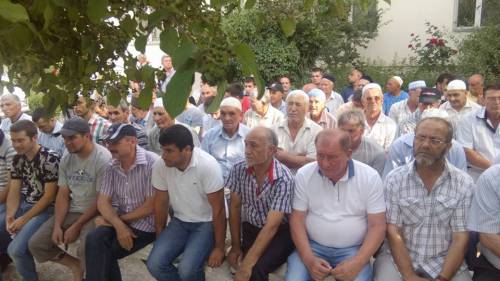Collective prayer in Russian-Occupied Crimea could be banned as ‘extremist’
 Duya, or prayer gathering outside the home of abducted Crimean Tatar activist Ervin Ibragimov
Duya, or prayer gathering outside the home of abducted Crimean Tatar activist Ervin Ibragimov
Crimean Imams have been warned that traditional prayer rituals at the homes of Crimean Muslims could fall under Russia’s new draconian ‘anti-extremism’ laws and be effectively prohibited. Such a new repressive move under Russian occupation has thus far only been hinted at, however the warning seems clear There have recently been prayer gatherings at the homes of abducted Crimean Tatar activist Ervin Ibragimov, and of men now in detention on concocted charges.
Said Ismagilov, Mufti of the Spiritual Directorate of Muslims of Ukraine, is outraged by such a prospect, pointing out that “such gatherings where the Quran is read, together with prayers for the dead, were not even prohibited in Soviet times. From childhood I saw how elderly people gathered in our home to pray for a person who had died. In those days when there wasn’t a single mosque in Ukraine, and you couldn’t openly carry out any Muslim rituals, that was all that remained for people from the faith of their parents. However modern Russia is attacking even everyday religious practice. You won’t even be able to pray at home, together with other relatives, for your parents. With such kinds of action, this sort of interference in people’s religious life, the Russian authorities are speeding up the collapse of their pseudo-empire. You can’t take components of people’s ethnic and religious identity away from them. It will become impossible to stop people when they are left with nothing to lose but their chains”.
Russia’s offensive against all public gatherings and Crimean Tatar remembrance began soon after its invasion and annexation of Crimea. In May 2014, the traditional remembrance gatherings marking the (seventieth) anniversary of the 1944 Deportation of the entire Crimean Tatar People were banned.
A blanket ban was attempted with this causing dismay and bemusement. Refat Chubarov, Head of the Crimean Tatar Mejlis [representative assembly] who had not yet been banished from his homeland, responded:
Can you imagine – there are 22 regions and in each region there are places where people come to honour the dead, places with memorial stones, and Crimean Tatars on May 17-18 don’t have the right to go there together to pay their respects, to honour those people! I don’t know what kind of person you have to be to not think of the consequences! I don’t know how to stop people so that they don’t go there. It’s like telling everybody “Don’t go to your holy places, don’t visit your dead” If they prohibited you, how would you act? Force can stop everything, or not everything – it won’t stop the human spirit.”
The occupiers did not, however, stop prayer gatherings on the outskirts of Simferopol and Bakhchysarai, although military helicopters flew overhead throughout the prayers. The repressive measures against all remembrance gatherings have intensified since then.
In recent months Duya, or collective prayer gatherings, have been held at least twice outside the home of Ervin Ibragimov and his parents. The young Crimean Tatar activist and member of the Executive Council of the World Congress of Crimean Tatars was abducted from near his home in the evening of May 24, 2016 and has not been seen since. There is video footage of the abduction with the men involved appearing to be in uniform, and the behaviour of the de facto authorities has generally aroused suspicion.
There have been other such gatherings at the home of imprisoned Mejlis leader Akhtem Chiygoz and of 14 Crimean Muslims, almost all Crimean Tatar, now in custody and facing absurd ‘terrorism’ charges over alleged involvement in an organization (Hizb ut-Tahrir) which is legal in Ukraine and most other countries.
In the face of terror and repression, Crimean Tatars have responded by showing solidarity with those oppressed or forcibly disappeared, and their families. One such way is by meeting in prayer.
Even that now appears to be at risk.
More about the so-called ‘anti-terrorist’ laws which came into force on July 20 here: Denounce others or face imprisonment in Russian-occupied Crimea





